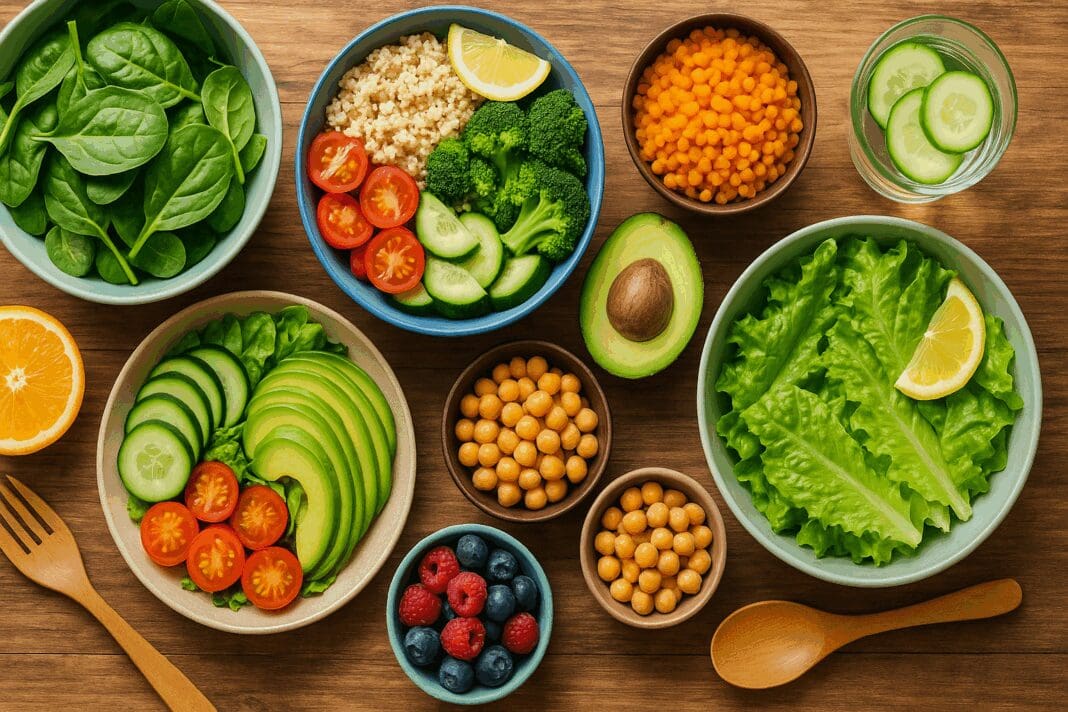Adopting a plant-based lifestyle can be a transformative journey toward holistic health and wellness. For women, especially, the intersection of nutrition, hormonal balance, and sustainable energy is critical, and vegan diets offer a powerful platform to meet those needs. Among the most compelling elements of this dietary shift are the wealth of effortless vegan weight loss recipes that cater not just to calorie reduction, but also to nutrient density and long-term satisfaction. This article explores how these plant-powered meals can support women in achieving their weight loss goals without sacrificing flavor, variety, or well-being.
You may also like: Top Expert-Recommended Vegan Main Meals to Fuel Women’s Health and Energy
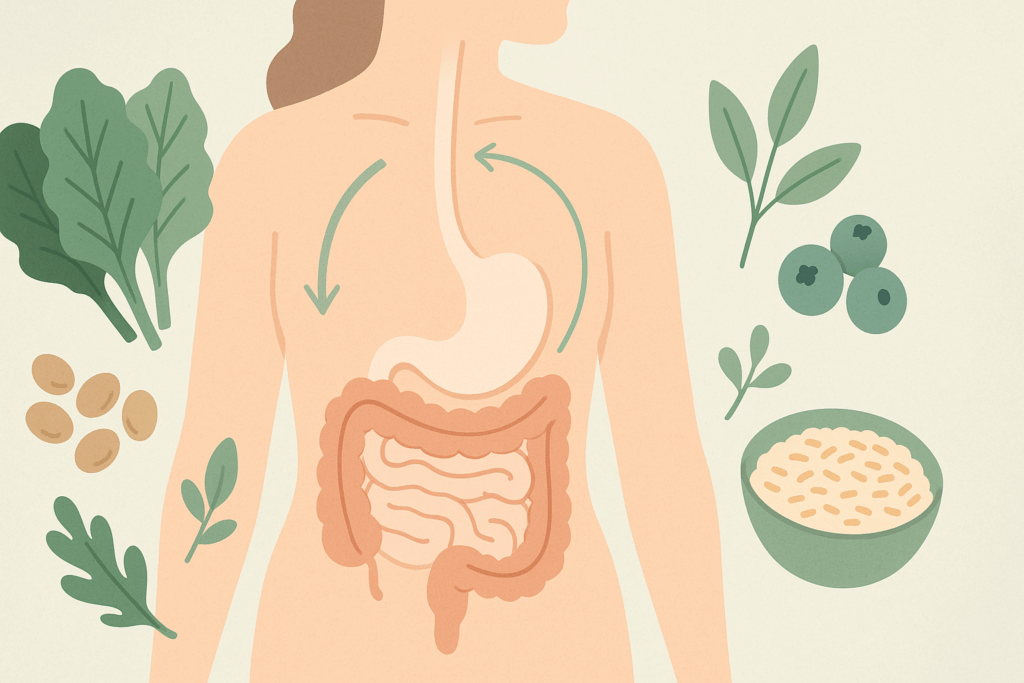
Understanding the Science Behind Plant-Based Weight Loss
The efficacy of a vegan diet for weight loss lies in its foundational reliance on whole, plant-based foods that are naturally low in calories and high in fiber. These characteristics promote satiety, reduce overall energy intake, and stabilize blood sugar levels, which are essential components in any successful weight loss plan. When structured correctly, a vegan diet is rich in antioxidants, phytonutrients, vitamins, and minerals that work synergistically to enhance metabolic health. For women, this can translate to more regulated appetite signals, improved digestion, and balanced hormone levels, all of which are critical for sustainable weight management.
Moreover, healthy vegetarian diet recipes to lose weight often eliminate high-fat animal products and processed convenience foods, which are commonly linked to weight gain, inflammation, and metabolic disruption. By centering meals around legumes, whole grains, vegetables, fruits, nuts, and seeds, the body receives clean-burning fuel that supports energy levels and muscle retention during fat loss. This nutrient-dense approach ensures that weight loss doesn’t come at the expense of essential nutrition, particularly important for women navigating unique physiological demands such as menstruation, pregnancy, or menopause.
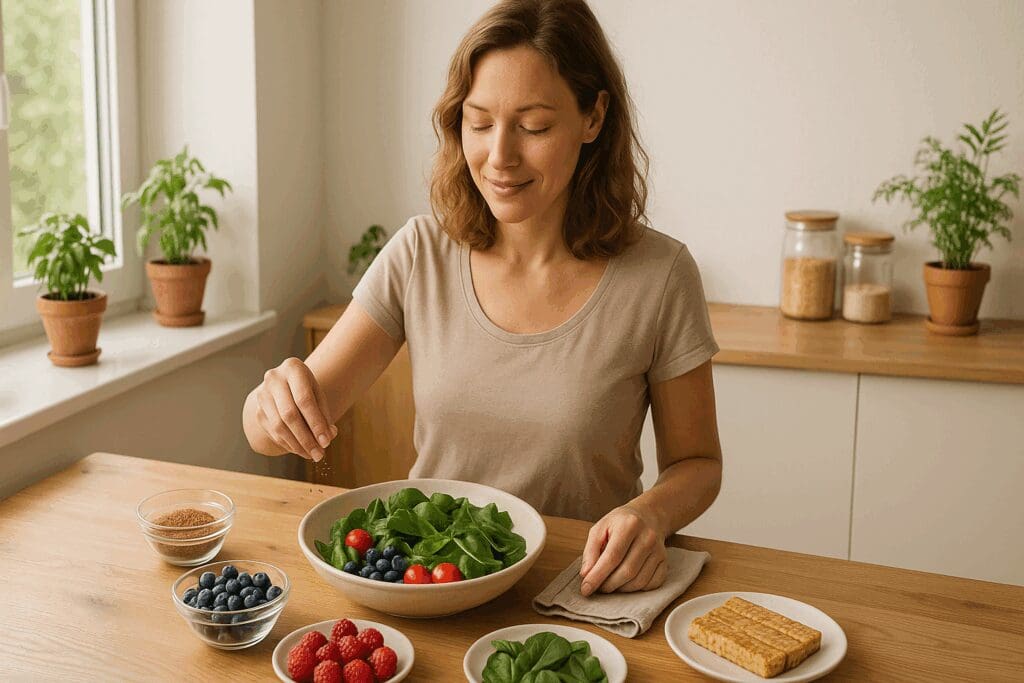
Why Vegan Weight Loss Works Specifically for Women
Women face unique biological and hormonal factors that can influence how their bodies respond to weight loss strategies. Insulin sensitivity, thyroid health, estrogen dominance, and cortisol levels all play a role in fat storage and energy regulation. Vegan diets, when designed mindfully, help to counter these obstacles by providing a steady supply of anti-inflammatory and hormone-regulating foods. Cruciferous vegetables, flaxseeds, berries, and fermented soy products, for instance, are known to support estrogen metabolism and reduce hormonal imbalances.
Additionally, many healthy vegetarian recipes for weight loss are naturally rich in magnesium, B vitamins, and omega-3 fatty acids from sources like leafy greens, whole grains, legumes, and chia seeds. These nutrients are vital for neurotransmitter synthesis and mood stability, which can combat emotional eating and support mental clarity throughout the weight loss journey. For women who often juggle multiple responsibilities, including caregiving and career demands, the emotional resilience bolstered by nutrient-dense vegan meals becomes an invaluable asset.
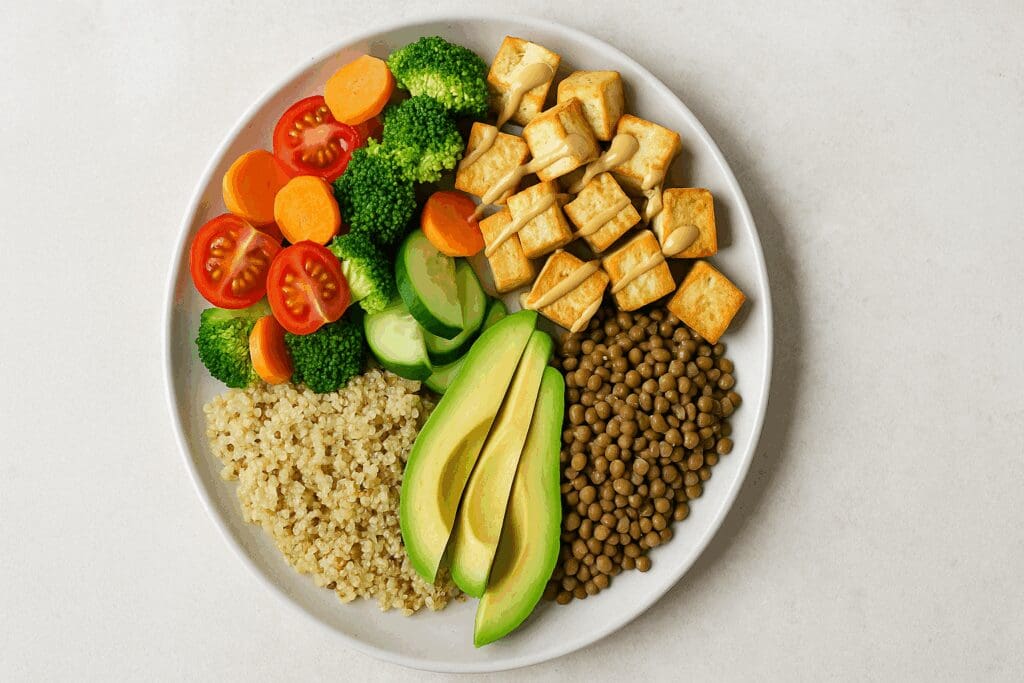
How to Build a Balanced Vegan Plate for Weight Loss
Creating a vegan plate that promotes fat loss while ensuring nutritional adequacy requires attention to macronutrient balance and food diversity. Start with a generous serving of non-starchy vegetables such as kale, broccoli, zucchini, or bell peppers. These vegetables provide bulk, fiber, and micronutrients with minimal caloric load. Next, add a high-quality plant protein such as lentils, chickpeas, tempeh, or tofu to support muscle maintenance and hormonal function.
Whole grains like quinoa, brown rice, or oats offer complex carbohydrates that fuel physical activity and satiety without spiking insulin levels. Healthy fats from avocados, tahini, hemp seeds, or walnuts contribute essential fatty acids and enhance the absorption of fat-soluble vitamins. This method of meal composition not only ensures satisfaction but also fosters metabolic flexibility—the body’s ability to switch between fuel sources efficiently.
Hydration, too, plays a crucial role in effective weight management. Many meatless meals for weight loss include water-rich ingredients such as cucumbers, tomatoes, and citrus fruits, which help to support kidney function, reduce bloating, and promote detoxification. Drinking herbal teas or infused water alongside meals further enhances digestive health and overall well-being.
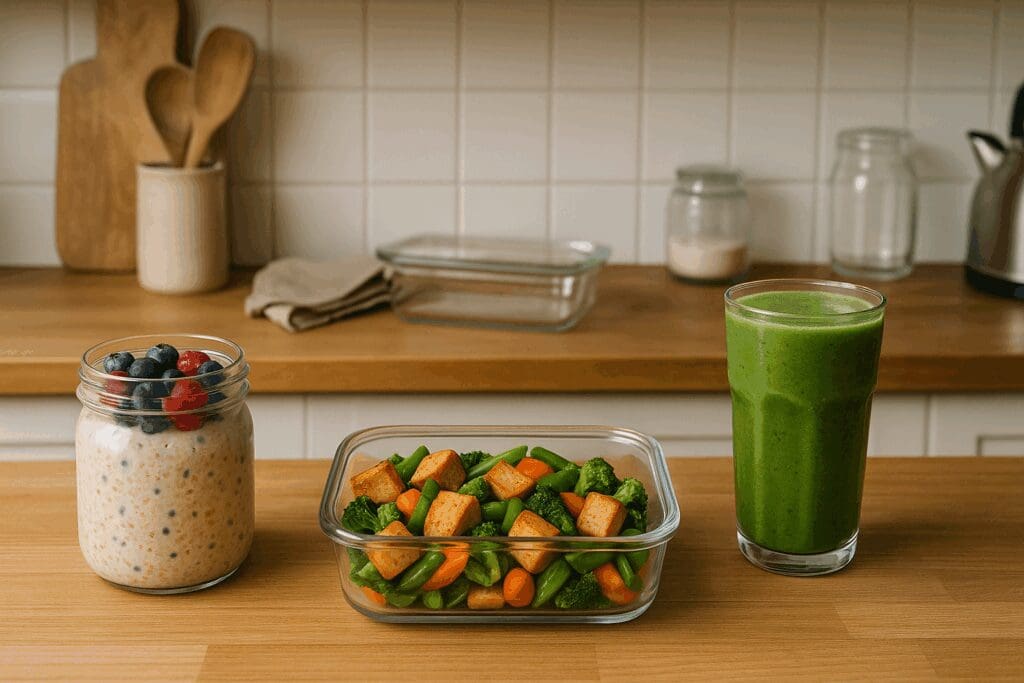
Delicious and Effortless Vegan Weight Loss Recipes for Busy Women
Time constraints are a common barrier to healthy eating, particularly for women balancing work, family, and personal care. Fortunately, many vegan weight loss recipes can be prepared in under 30 minutes using pantry staples and minimal equipment. For example, a hearty lentil and vegetable stew made with carrots, celery, tomatoes, and herbs can be batch-cooked and frozen for convenient lunches or dinners. Similarly, overnight oats with almond milk, chia seeds, and fresh berries provide a satisfying and portable breakfast option.
For those seeking healthy veggie meals to lose weight without spending hours in the kitchen, stir-fries are a versatile and speedy solution. A mix of bell peppers, mushrooms, snap peas, and tofu, sautéed in a garlic-ginger tamari sauce and served over quinoa or cauliflower rice, delivers a complete and flavorful meal. Salads, too, can be reinvented with unique ingredients like roasted sweet potatoes, black beans, avocado, and tahini dressing for a nutrient-packed bowl that satisfies hunger and taste.
Smoothies offer another effortless meal solution. Blending spinach, frozen bananas, flaxseeds, and unsweetened almond milk creates a creamy, fiber-rich beverage that supports satiety and energy. Including protein powders made from pea, hemp, or brown rice further enhances the nutritional profile, especially for women aiming to preserve lean mass while reducing fat.
The Role of Meal Prepping in Vegan Weight Loss Success
One of the most effective strategies for maintaining a healthy weight is meal planning and preparation. Prepping meals in advance reduces reliance on takeout or convenience foods and allows greater control over portion sizes and ingredients. For women managing multiple responsibilities, dedicating a few hours each week to prepare vegetarian meals for weight loss can result in sustained dietary adherence and reduced stress around mealtime decisions.
Start by selecting three to four core recipes for the week—such as a chickpea curry, roasted vegetable quinoa salad, hearty lentil soup, and black bean tacos. Cook in large batches and portion meals into individual containers for grab-and-go convenience. Complement these main dishes with ready-to-eat snacks like hummus and veggie sticks, fruit and nut packs, or homemade energy balls made with dates and seeds. By having healthy options readily available, it becomes easier to avoid impulsive eating and stay aligned with nutritional goals.
To keep variety and excitement in your meal prep routine, rotate ingredients weekly and experiment with global flavors. Incorporate spices such as cumin, turmeric, paprika, and coriander to enhance taste without added calories. Cooking with seasonal produce not only saves money but also ensures maximum freshness and nutrient content.
Optimizing Weight Loss with Nutritional Timing and Mindful Eating
In addition to what you eat, when and how you eat significantly impacts weight loss outcomes. Eating at consistent times throughout the day supports stable blood sugar and reduces the likelihood of overeating. Aim for three balanced meals with one or two small snacks if needed, and try to avoid late-night eating, which can disrupt circadian rhythms and impair digestion.
Mindful eating practices such as slowing down, chewing thoroughly, and eliminating distractions during meals encourage better satiety cues and reduce the likelihood of emotional or binge eating. Women often experience fluctuating hunger patterns due to hormonal shifts, and tuning into internal signals rather than external cues can support a more intuitive and sustainable approach to weight management.
Intermittent fasting, when used appropriately and under medical guidance, may also be compatible with vegan diets. A common method involves eating within an eight-hour window and fasting for the remaining 16 hours. This approach can enhance insulin sensitivity, reduce inflammation, and support fat oxidation. However, it’s important to ensure that the meals consumed within the eating window are rich in nutrients to meet daily requirements.
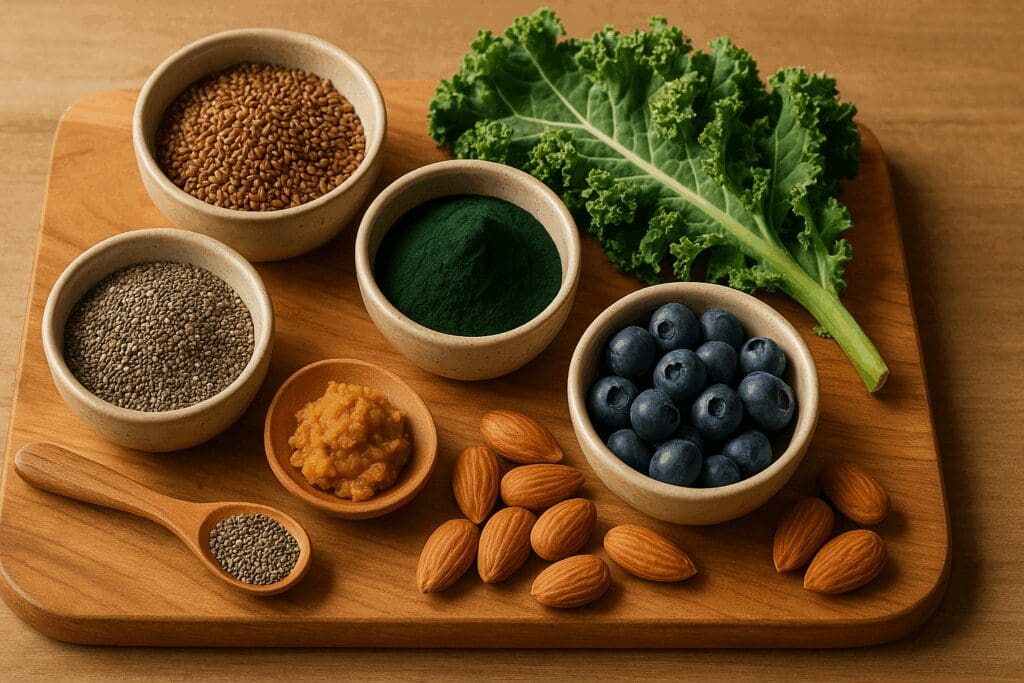
Incorporating Superfoods into Everyday Vegan Weight Loss Recipes
Superfoods are nutrient-dense ingredients that offer additional health benefits beyond basic nutrition. Including these foods in vegan weight loss recipes not only boosts flavor and satisfaction but also enhances metabolic function and immune resilience. Leafy greens like kale, Swiss chard, and arugula are high in chlorophyll, folate, and calcium, supporting detoxification and bone health. Berries provide a rich source of antioxidants, which combat oxidative stress and may support weight loss by improving insulin response.
Legumes, including lentils, chickpeas, and black beans, are staples in many vegetarian recipes for weight loss. They provide plant-based protein, complex carbohydrates, and fiber, making them ideal for blood sugar regulation and digestive health. Nuts and seeds such as chia, flax, sunflower, and pumpkin seeds contribute healthy fats, protein, and trace minerals, which are essential for hormonal balance and appetite regulation.
Fermented foods like tempeh, miso, and sauerkraut introduce beneficial bacteria into the gut microbiome, which has been linked to better metabolic control and reduced inflammation. Incorporating a tablespoon of sauerkraut or a serving of miso soup into daily meals can have cumulative benefits for digestive and immune health.
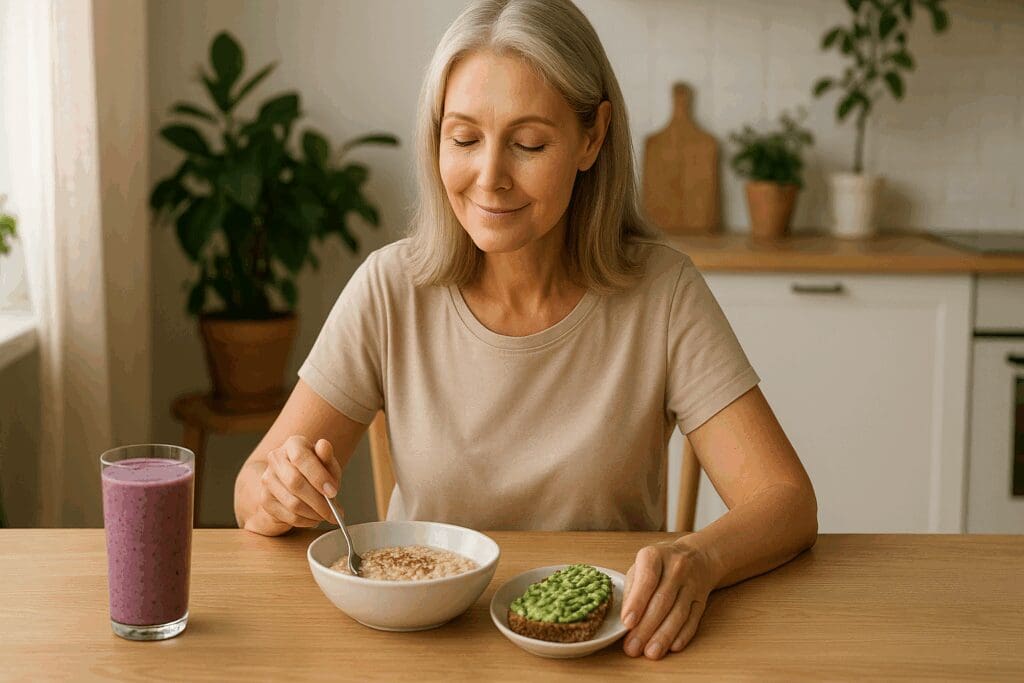
Vegan Weight Loss Recipes That Promote Hormonal Balance
Hormonal fluctuations play a significant role in weight gain and loss, particularly for women in reproductive, perimenopausal, and postmenopausal phases. A key strategy is incorporating foods that support liver detoxification and estrogen metabolism, such as cruciferous vegetables, dandelion greens, and artichokes. These ingredients can be used in soups, stir-fries, and grain bowls for flavorful and supportive meals.
Flaxseeds are particularly beneficial due to their lignan content, which can bind excess estrogen and support hormonal equilibrium. Ground flaxseeds can be sprinkled on oatmeal, blended into smoothies, or incorporated into homemade vegan baked goods. Additionally, adaptogenic herbs such as ashwagandha and maca root can be added to energy balls or warm beverages to help regulate cortisol and improve energy resilience.
The inclusion of healthy fats from avocados, coconut, and olive oil also aids in the production of sex hormones and supports skin, hair, and reproductive health. A well-structured weight loss vegetarian diet recipe will thoughtfully integrate these ingredients to ensure that caloric reduction does not compromise hormonal vitality or emotional well-being.
Avoiding Common Pitfalls in Plant-Based Weight Loss
While vegan diets offer a wealth of benefits, there are common challenges that can impede weight loss if not addressed. Over-reliance on processed vegan foods—such as mock meats, sugary granola bars, or refined grains—can lead to excess calorie intake and nutritional imbalances. Reading ingredient labels and prioritizing whole-food versions of convenience items is critical.
Another common issue is under-eating protein, which can result in muscle loss and reduced metabolic rate. Women should aim for 0.8 to 1 gram of protein per pound of goal body weight, sourcing it from a variety of legumes, whole grains, and plant-based protein powders. Complementary pairings, such as rice and beans or hummus with whole grain pita, ensure a complete amino acid profile.
Micronutrient deficiencies can also be a concern. Vegan diets must be carefully planned to include adequate sources of iron, zinc, calcium, vitamin B12, and vitamin D. Fortified foods and appropriate supplementation under a healthcare provider’s guidance are often necessary, particularly for B12, which is not naturally present in plant foods.
The Power of Community and Support in Achieving Weight Loss Goals
Weight loss is not solely a physical journey; it is also deeply emotional and social. Engaging with supportive communities—whether through social media, local wellness groups, or online forums—can provide encouragement, accountability, and shared experiences. Women who feel empowered and connected are more likely to sustain healthy habits over time.
Sharing vegan weight loss recipes with friends or family members creates opportunities for communal meals, bonding, and experimentation in the kitchen. Hosting plant-based potlucks, participating in vegan challenges, or subscribing to recipe newsletters can infuse variety and joy into the dietary experience. When the journey becomes less about restriction and more about discovery, the likelihood of long-term success increases.
Reflecting on Your Journey and Staying Motivated
Tracking progress beyond the scale is essential for maintaining motivation. Celebrate milestones such as improved energy, better digestion, clearer skin, or reduced bloating—all signs that your body is responding positively to your new way of eating. Journaling your thoughts, documenting meals, and reflecting on your intentions can strengthen your emotional connection to your goals.
Adjustments may be necessary as your body changes or as your lifestyle evolves. Stay curious and open to new ingredients, cooking methods, and nutrition knowledge. Consult with a registered dietitian familiar with plant-based diets to ensure that your approach remains balanced, safe, and aligned with your health needs.
Frequently Asked Questions About Effortless Vegan Weight Loss Recipes
What are the most overlooked nutrients in vegan weight loss recipes, and how can women ensure they’re getting enough?
Many women following vegan weight loss recipes unknowingly overlook critical micronutrients like iodine, selenium, and vitamin K2. While commonly discussed nutrients such as B12 and iron receive adequate attention, these lesser-known elements play vital roles in thyroid regulation, antioxidant function, and calcium metabolism. Sea vegetables like nori and dulse can be added to soups or salads for iodine, while Brazil nuts offer a rich source of selenium in just one or two kernels per day. For vitamin K2, fermented foods such as natto are excellent but underutilized. Integrating these foods into healthy vegetarian recipes for weight loss ensures that weight management doesn’t compromise long-term wellness.
Can weight loss vegetarian diet recipes support athletic performance and muscle retention?
Absolutely, with proper planning. Contrary to the misconception that vegan or vegetarian diets lack sufficient protein, plant-based sources like lentils, chickpeas, quinoa, soy products, and pea-based protein powders offer complete or complementary amino acid profiles necessary for muscle synthesis. Healthy vegetarian diet recipes to lose weight can be optimized for fitness by timing protein intake around workouts and incorporating nutrient-dense snacks like protein-packed smoothie bowls or almond butter oat bites. Moreover, strategic use of leucine-rich foods such as tempeh or pumpkin seeds can further enhance muscle retention. When balanced well, meatless meals for weight loss can double as recovery meals for active lifestyles.
How can someone transition to vegan weight loss recipes without overwhelming their routine?
Gradual integration is key. Start by swapping out one meal per day with a vegan option, such as replacing your usual lunch with a chickpea salad wrap or a tofu stir-fry. Planning meals around themes—like “Meatless Mondays” or “Smoothie Saturdays”—can simplify choices and reduce decision fatigue. Batch-cooking staple items like brown rice, lentils, or roasted vegetables helps streamline preparation. Also, rotating a few core recipes makes it easier to stay consistent; for instance, rotating between healthy veggie meals to lose weight like quinoa bowls, lentil soups, and vegetable curries prevents boredom while keeping meals simple. The less drastic the shift, the more sustainable the habit becomes.
What are some advanced tips for meal prepping vegetarian meals for weight loss?
Beyond basic batch cooking, strategic layering of meals throughout the week can save time and preserve freshness. For example, prepare a large batch of roasted vegetables and repurpose them in salads, wraps, and grain bowls across several days. Freezing individual portions of stews or chili in silicone trays helps with portion control and spontaneous mealtimes. Including one or two dressings or sauces—like tahini lemon or cashew pesto—can transform the flavor profile of otherwise repetitive meals. Also, incorporating high-fiber components in advance, such as chia puddings or overnight oats, supports satiety without last-minute preparation. These techniques elevate weight loss vegetarian diet recipes from routine to refined.
How can vegan weight loss recipes address emotional eating and stress-related cravings?
Understanding the emotional triggers behind food choices is the first step in using vegan nutrition as a therapeutic tool. Foods rich in magnesium and B vitamins—such as leafy greens, oats, and legumes—help regulate stress responses and improve mood, reducing the urge for high-calorie comfort foods. Creating warm, nourishing meals like butternut squash soup or cinnamon-spiced baked apples with almond butter provides both physical satisfaction and emotional comfort. Healthy vegetarian recipes for weight loss can also include adaptogenic herbs like ashwagandha or reishi mushrooms in teas or smoothies to promote calm. Over time, these practices reshape the brain’s association between food and relief, fostering resilience rather than reliance.
What trends are emerging in plant-based weight loss, especially for women over 40?
In women over 40, the focus is shifting from caloric restriction to hormonal harmony and gut health. Emerging trends include personalized nutrition guided by microbiome analysis, which tailors healthy vegetarian diet recipes to individual digestive patterns. Phytoestrogen-rich foods like flaxseeds and fermented soy are being highlighted for supporting estrogen balance during perimenopause. Additionally, plant-based intermittent fasting protocols that incorporate nutrient-dense broths, smoothies, and light meals are gaining traction. These approaches emphasize sustainable energy and cognitive clarity over extreme restriction. Vegan weight loss recipes that are mindful of these changes help align dietary strategies with the evolving physiology of mature women.
Are there culturally diverse vegetarian recipes for weight loss that are both authentic and slimming?
Absolutely. Global cuisines offer a treasure trove of plant-based dishes that naturally align with weight loss goals. Indian dals, Ethiopian lentil stews, Middle Eastern mujadara, and Korean bibimbap (customized with tofu and vegetables) are rich in fiber, spices, and flavor without excessive fat. These dishes often incorporate legumes and whole grains as staples, making them inherently supportive of metabolic health. Adapting these traditional meals slightly—for instance, baking rather than frying or using brown rice instead of white—can make them ideal vegetarian recipes for weight loss without compromising authenticity. Embracing diverse culinary traditions also prevents dietary monotony and supports long-term adherence.
How do healthy veggie meals to lose weight affect gut health and digestion?
Fiber-rich vegetables promote a flourishing gut microbiome, which in turn influences everything from metabolism to mood. Cruciferous vegetables like broccoli and cauliflower contain prebiotic compounds that feed beneficial bacteria, enhancing digestion and nutrient absorption. When combined with fermented foods such as kimchi or sauerkraut, these meals introduce probiotics that further support gastrointestinal balance. However, some individuals may initially experience bloating when transitioning to high-fiber diets. Gradual increases in fiber and adequate hydration can mitigate this. The synergy of prebiotics and probiotics in healthy veggie meals to lose weight can significantly enhance overall gut health, which supports weight regulation from the inside out.
What pantry staples should every woman keep for effortless meatless meals for weight loss?
A well-stocked pantry simplifies meal creation and minimizes reliance on processed foods. Essential staples include canned beans (black, chickpeas, lentils), whole grains (quinoa, brown rice, bulgur), and shelf-stable plant-based milks (almond, oat, soy). Nutritional yeast adds cheesy flavor and vitamin B12 to dishes, while tamari or coconut aminos bring depth to stir-fries and marinades. Dried herbs and spices such as cumin, turmeric, and smoked paprika are invaluable for flavor without calories. Nut butters and seed butters round out sauces and smoothies, offering healthy fats that enhance satisfaction. With these basics on hand, whipping up vegetarian meals for weight loss becomes a quick and rewarding routine.
How can vegan weight loss recipes support long-term metabolic health beyond just weight loss?
The benefits of plant-based diets extend well beyond the scale. Foods rich in polyphenols—such as berries, cocoa, and leafy greens—support insulin sensitivity and endothelial function, both of which are central to heart and metabolic health. Regular consumption of anti-inflammatory ingredients found in vegan weight loss recipes may reduce the risk of type 2 diabetes and cardiovascular disease. The emphasis on whole foods, fiber, and healthy fats also contributes to steady energy levels and hormonal balance, especially during times of physiological transition like menopause. Over time, these meals contribute to a metabolic environment that favors healthspan and vitality, not just a slimmer waistline.
Conclusion: Building a Lifelong Foundation with Vegan Weight Loss Recipes
Effortless vegan weight loss recipes offer more than a temporary dietary solution—they provide a sustainable path to wellness grounded in nourishment, balance, and joy. For women seeking to align their weight loss efforts with their values, biological needs, and lifestyle demands, a thoughtfully designed plant-based approach can deliver transformative results. By integrating healthy vegetarian recipes for weight loss into daily life, embracing whole foods, and cultivating supportive habits, it becomes possible to achieve not only a healthier weight but also a more vibrant, energetic, and empowered existence.
The journey toward optimal health is ongoing, and every recipe crafted, every meal shared, and every positive shift in mindset reinforces the foundation of long-term success. As you continue exploring new ingredients, experimenting with flavors, and honoring your body’s cues, remember that weight loss is not a destination but a process of becoming your most nourished self—one effortless, plant-powered meal at a time.

